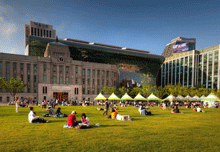- Who We Are
- How We Work
- Regional / Country Initiatives
- Legacy
- Core Themes
- Working Groups
- Portfolio & Results
- Newsroom
- Resources
Solutions from Seoul
Sharing Experiences in Sustainable Urban Policy

Seoul is one of the few cities globally that has successfully accommodated the housing and service needs of its growing population, while at the same time creating economic opportunities for citizens. It has also made great strides in improving commuting for residents – a key part of quality of life.
Here, Cities Alliance, CityNet and Seoul Metropolitan Government share some of the municipality's best practices in a knowledge series titled “Solutions from Seoul.”
Editions of Solutions from Seoul
| TOPIS: The Control Tower for Seoul’s Intelligent Transportation System | ||||||

|
January 2015 The Seoul Metropolitan Government’s Transport Operation and Information Service (TOPIS) is the “control tower” for the city’s transportation system. It gathers and processes real-time road traffic and subway train information to enable the city to efficiently manage the interval between buses, relieve congestion and take timely action in case of an accident.
|
|||||
| “Owl Bus” Based on Big-Data Technology | ||||||

|
December 2014 The first of its kind in Korea, Seoul's “Owl Bus” is an innovative late-night bus service that has made travel cheaper and safer for city residents.The Seoul Metropolitan Government (SMG) worked together with a local telecommunications firm, KT, to identify areas of the city that saw the most call volume during the hours from 1am to 5am, and developed the routes accordingly. Residents were involved in the entire process of conceptualising and launching new service.
|
|||||
